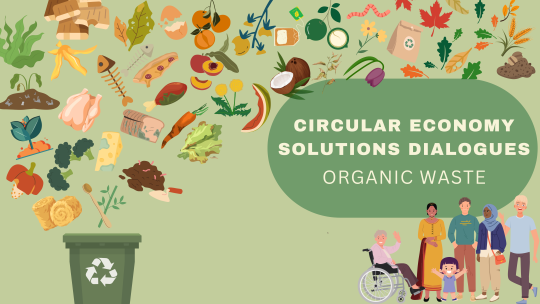Circular Economy Solutions Dialogues (CESD) - Organic Waste
Organic Matter: Waste or Resource?
Wed, Jun 19 2024, Europe/Berlin: 12 - 1:30pm
Wed, Sep 25 2024, Europe/Berlin: 12 - 1:30pm

After the successful completion of the Circular Economy Solutions Dialogues (CESD) which took place in 2021 and 2022 (final report), the Deutsche Gesellschaft für Internationale Zusammenarbeit (GIZ) GmbH launches a second set of dialogues on behalf of the German Federal Ministry for the Environment, Nature Conservation, Nuclear Safety and Consumer Protection (BMUV).
The CESD will nourish an exchange on how to advance the global circular economy agenda, focusing on selected priority issues.
The CESD will:
- comprise of 4 successive and interactive online dialogues + 1 public presentation of the outcomes
- be multidisciplinary: dialogue participants include ca. 30 policy makers, businesses, representatives of civil society, academia, think tanks and international organisations
- take place on 24 April, 22 May, 19 June, 25 September (12:00 – 13:30 CET), public presentation (tbd)
CESD on Organic Waste
Organic waste comprises any residual organic matter that can be decomposed into carbon dioxide, water, methane, or simple organic molecules through processes like composting, aerobic digestion, anaerobic digestion, or similar methods (UNEP).
As cities grow worldwide, managing organic waste becomes harder. This waste, like food scraps and yard trimmings, is a large part of what we throw away, especially in low- and middle-income economies. Sadly, much of organic residuals end up in landfills or illegal dumps, releasing harmful gases like methane that contribute significantly to climate change. Organic residuals are both a challenge and an opportunity – they can be turned into energy or used to improve soil.
The upcoming dialogue series aims to explore how organic waste prevention can be achieved, discuss viable policy and technology pathways capable of alleviating the adverse environmental and climate impacts associated with organic residuals, and promote solutions and practices that value organic resources. We’ll also address changing behaviours and consider both urban and rural perspectives, exploring new ways to prevent organic waste and use organic matter wisely.
Agenda
| 24 April 2024 | How can we acknowledge organic waste as a resource? An introduction to the current global situation in the organic waste value chain. |
| 22 May 2024 | How can we support the circular flows of organic matter between urban and rural spaces? An exploration of the urban-rural dynamics of organic waste. |
| 19 June 2024 | What methods and technologies can help us to prevent the creation of organic waste and encourage its usage across sectors? New approaches for turning organic waste into resources. |
| 25 September 2024 | How can policies harness organic resources? Policies, stakeholders, finances, and incentives |